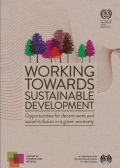The book includes case studies from Hannover (Germany), Auckland (New Zealand), Flanders (Belgium), Western Canada, City of Raleigh (United States), and Kyoto (Japan).
Bringing together 35 contributions from over 60 experts from research, the private sector, international organisations and local governments worldwide, ICLEI’s compendium bridges the gap between the global promotion of the concept and its actual realisation on the ground by illustrating the advantages of the Green Urban Economy approach with concrete and practical examples.
By embedding both economic and environmental concerns in policymaking, the compendium calls for smarter approaches and innovation in applying existing tools and new methods towards achieving sustainable urban development. Covering issues such as governance, economics, new business models, green jobs, technology, infrastructure, urban poverty, it is also an acknowledgement of and call for more locally responsive actions, new thinking and research.
The book includes case studies from Hannover (Germany), Auckland (New Zealand), Flanders (Belgium), Western Canada, City of Raleigh (United States), and Kyoto (Japan).
This report synthesises the findings from six case studies of urban green growth policies, four at city level (Paris, Chicago, Stockholm, Kitakyushu) and two at the national level (China, Korea). It offers a definition of urban green growth and a framework for analysing how it might play out in different types of cities. It demonstrates the importance of urban policies for achieving national environmental policy goals and discusses the increased efficiency of policy intervention at the urban level. It identifies urban activities to reduce environmental impact that are most likely to contribute to the policy priorities of job creation, urban attractiveness, metro-regional supply of green products and services, and increased urban land values. It also provides guidance on addressing potential financing and governance challenges that may arise in pursuing urban green growth. Finally, the report offers a preliminary proposal for how green growth in cities could be measured.
China’s economy continues to grow rapidly with corresponding increases in both energy consumption and environmental pollution. Renewable energy is a key part of China’s response to this challenge. Currently, the costs of measures to facilitate the large-scale deployment of renewable energy are primarily met through an electricity surcharge—effectively a tax on electricity consumption. However, concerns have been raised that continuing to rely on the surcharge alone places a disproportionate burden on electricity consumers. In response, the International Institute for Sustainable Development (IISD) and the China National Renewable Energy Centre (CNREC) identified the need for further debate on how best to fund renewable energy and reduce environmental pollution, leading to the establishment of a research project to examine the international experience of similar schemes and their relevance to China.
The publication includes case studies from Australia, Canada, Denmark, Germany, India, Japan, the United Kingdom, and the United States.

This joint study by the International Labour Organisation (ILO) and the United Nations Environment Programme (UNEP) highlights that the transformation to a greener economy could generate 15 to 60 million additional jobs globally over the next two decades and lift tens of millions of workers out of poverty. The report documents evidence that for countries at all levels of development the drive towards environmental sustainability and greener economies is gaining momentum. The study indicates that job growth has been particularly strong in the renewable energy sector, with a global increase of 21 per cent per annum. As a result, the sector now employs close to 5 million workers; more than double the number employed only a few years ago.
This summary was prepared by Eldis.

